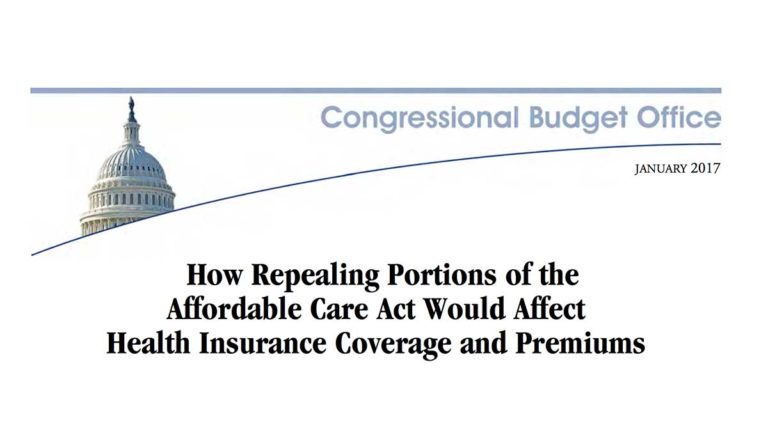What’s In the CBO Report?

Read Time: 4 minutes
Published:
On January 17, the Congressional Budget Office (CBO) published an important report about the likely impact of repealing the Affordable Care Act (ACA). To be clear, this report was not an analysis of any particular plan put forward by Republicans in the 115th Congress. There is not yet an ACA repeal or replacement bill to analyze.
Instead, the CBO focused on what the financial, budgetary, and health insurance coverage impact would be if the U.S. government passed H.R. 3762, a 2015 act that was vetoed by former President Barack Obama that, if enacted, would effectively repeal two major provisions of the Affordable Care Act (ACA). First, H.R. 3762 would eliminate the ACA’s provision that non-exempt individuals buy health insurance or else pay a tax (the individual mandate) and the ACA’s provision that large employers pay a tax if they do not offer health insurance to their employees that meets certain standards (the employer mandate). Second, H.R. 3762 would end both the ACA’s Medicaid expansion and its subsidies that help low-income individuals buy health insurance. H.R. 3762 would also make other changes that would not have as large of an effect on health insurance coverage and premiums.
However, H.R. 3762 would leave in place several market reforms that the ACA enacted. More specifically, if the U.S. government passed something resembling H.R. 3762, then health insurers would still need to comply with the ACA-established requirements that they sell consumers insurance plans that meet certain coverage standards, that they refrain from denying health insurance coverage to persons with pre-existing conditions, and that they set premiums based only on individuals’ age, tobacco usage, and residency.
The CBO and the Joint Committee on Taxation (JCT) estimate that H.R. 3762 would do the following:
• The number of uninsured Americans would increase by 18 million people by the end of the first new plan year after the U.S. government implemented H.R. 3762’s policy changes.
• After the end of the Medicaid expansion and the subsidies that currently help people buy health insurance on the marketplaces, the number of uninsured Americans would be 27 million more than what it would if the present version of the ACA was in effect.
• In 2026, 32 million fewer Americans would be insured than would be if the current law remained in place.
• During the first year after the enactment of H.R.3762, premiums for health insurance plans that customers purchased on the non-group market would be 20 to 25 percent higher than if the current law was in effect.
• Compared to if the current law was in place, premiums would increase by 50 percent in the year after the U.S. government ended the Medicaid expansion and stopped offering subsidies to help low-income Americans buy health insurance on the marketplaces.
• By 2026 premiums on the non-group market would be twice as a high as they would be if the current law was in effect.
Leading Republicans criticized the report, saying it fails to take into account the effects of the replacement plan they would enact with the ACA’s repeal. For its part, the CBO cautions that “The ways in which individuals, employers, states, insurers, hospitals, and other affected parties would respond to the changes made by H.R. 3762 are all difficult to predict. As a result, the CBO claims that the report’s estimates “are uncertain.” We should thus not interpret these estimates to be exactly accurate predictions of the impact of the ACA’s repeal.
Rather, we should read the CBO and JCT’s estimates as potential indicators of the direction of health insurance trends in the event that the U.S. government repeals the ACA’s individual mandate, employer mandate, Medicaid expansion, and subsidies to help low-income individuals buy health insurance but does not enact other policies to offset the financial, budgetary, and health insurance coverage impacts of these changes.
President Trump has promised to get rid of the ACA, while also achieving universal coverage along with lowering premiums and deductibles. This CBO reports suggests Republicans will find it very difficult to achieve all these goals.
Featured Image: From the Congressional Budget Office report “How Repealing Portions of the Affordable Care Act Would Affect Health Insurance Coverage and Premiums”



